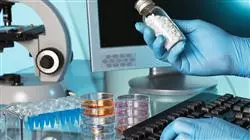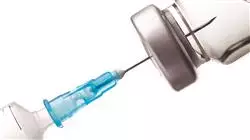University certificate
The world's largest faculty of pharmacy”
Introduction to the Program
La importancia actual de la investigación farmacológica convierte a este Postgraduate certificate en una especialización imprescindible para los farmacéuticos que deseen especializarse en este campo”

El principal objetivo de este Postgraduate certificate es capacitar a los farmacéuticos en el ámbito de los Ensayos Clínicos. Así, una vez superada esta especialización, el alumno habrá adquirido los conocimientos y habilidades específicos que le permitirán participar en investigaciones farmacológicas, aportando todo su saber y alcanzando el éxito en su trabajo.
Para ello, en este programa educativo se abordan los conceptos esenciales para fundamentar la complejidad a nivel metodológico y semántico de los Ensayos Clínicos, estableciéndose las distintas categorías de este trabajo y dando una gran importancia a la investigación post-comercialización de los productos. También se pondrá el foco en las muestras de medicamentos en investigación y en la normativa vigente en la materia, con el objetivo de que todos los procedimientos se lleven a cabo cumpliendo las normas éticas, legales y de buena práctica clínica.
Para la elaboración de este Postgraduate certificate, TECH cuenta con un equipo de profesionales de alto nivel, que ofrecerá a sus alumnos toda la experiencia de su trabajo en el ámbito investigativo y docente. Todo esto convierte a este Postgraduate certificate en uno de los más actualizados y completos del mercado, y ofrece al farmacéutico una visión general de los Ensayos Clínicos, pero con casos especiales y particulares en los que estas investigaciones han resultado sumamente importantes y beneficiosas.
Además, al ser 100% online, el propio alumno decidirá desde dónde y cuándo estudiar, de tal manera que podrá compaginar su tiempo de estudio con su faceta laboral y su vida privada, y utilizando una novedosa metodología multimedia que le hará más comprensible la parte teórica de esta capacitación.
Amplía tus conocimientos a través de este Postgraduate certificate que te permitirá especializarte hasta conseguir la excelencia en este ámbito”
Este Postgraduate certificate en Clinical Trials contiene el programa científico más completo y actualizado del mercado. Las características más destacadas del programa son:
- El desarrollo de casos prácticos presentados por expertos en Ensayos Clínicos
- Los contenidos gráficos, esquemáticos y eminentemente prácticos con los que están concebidos recogen una información científica y práctica sobre aquellas disciplinas indispensables para el ejercicio profesional
- Las novedades sobre Ensayos Clínicos
- Los ejercicios prácticos donde realizar el proceso de autoevaluación para mejorar el aprendizaje
- Su especial hincapié en metodologías innovadoras en Ensayos Clínicos
- Las lecciones teóricas, preguntas al experto, foros de discusión de temas controvertidos y trabajos de reflexión individual
- La disponibilidad de los contenidos desde cualquier dispositivo fijo o portátil con conexión a internet
Este Postgraduate certificate es la mejor inversión que puedes hacer en la selección de un programa de actualización por dos motivos: además de poner al día tus conocimientos en Ensayos Clínicos, obtendrás una titulación avalada por TECH”
Incluye en su cuadro docente a profesionales pertenecientes al ámbito de la Sanidad, que vierten en esta capacitación la experiencia de su trabajo, además de reconocidos especialistas de sociedades de referencia y universidades de prestigio.
Su contenido multimedia, elaborado con la última tecnología educativa, permitirá al profesional un aprendizaje situado y contextual, es decir, un entorno simulado que proporcionará una educación inmersiva programada para entrenarse ante situaciones reales.
El diseño de este programa se centra en el Aprendizaje Basado en Problemas, mediante el cual el sanitario deberá tratar de resolver las distintas situaciones de práctica profesional que se le planteen a lo largo del Postgraduate certificate. Para ello, el profesional contará con la ayuda de un novedoso sistema de vídeo interactivo realizado por reconocidos expertos en el campo de los Ensayos Clínicos y con gran experiencia.
No dudes en realizar esta especialización con nosotros. Encontrarás el mejor material didáctico con lecciones virtuales”

Este Postgraduate certificate 100% online te permitirá compaginar tus estudios con tu labor profesional a la vez que aumentas tus conocimientos en este ámbito”
Why study at TECH?
TECH is the world’s largest online university. With an impressive catalog of more than 14,000 university programs available in 11 languages, it is positioned as a leader in employability, with a 99% job placement rate. In addition, it relies on an enormous faculty of more than 6,000 professors of the highest international renown.

Study at the world's largest online university and guarantee your professional success. The future starts at TECH”
The world’s best online university according to FORBES
The prestigious Forbes magazine, specialized in business and finance, has highlighted TECH as “the world's best online university” This is what they have recently stated in an article in their digital edition in which they echo the success story of this institution, “thanks to the academic offer it provides, the selection of its teaching staff, and an innovative learning method aimed at educating the professionals of the future”
A revolutionary study method, a cutting-edge faculty and a practical focus: the key to TECH's success.
The most complete study plans on the university scene
TECH offers the most complete study plans on the university scene, with syllabuses that cover fundamental concepts and, at the same time, the main scientific advances in their specific scientific areas. In addition, these programs are continuously being updated to guarantee students the academic vanguard and the most in-demand professional skills. In this way, the university's qualifications provide its graduates with a significant advantage to propel their careers to success.
TECH offers the most comprehensive and intensive study plans on the current university scene.
A world-class teaching staff
TECH's teaching staff is made up of more than 6,000 professors with the highest international recognition. Professors, researchers and top executives of multinational companies, including Isaiah Covington, performance coach of the Boston Celtics; Magda Romanska, principal investigator at Harvard MetaLAB; Ignacio Wistumba, chairman of the department of translational molecular pathology at MD Anderson Cancer Center; and D.W. Pine, creative director of TIME magazine, among others.
Internationally renowned experts, specialized in different branches of Health, Technology, Communication and Business, form part of the TECH faculty.
A unique learning method
TECH is the first university to use Relearning in all its programs. It is the best online learning methodology, accredited with international teaching quality certifications, provided by prestigious educational agencies. In addition, this disruptive educational model is complemented with the “Case Method”, thereby setting up a unique online teaching strategy. Innovative teaching resources are also implemented, including detailed videos, infographics and interactive summaries.
TECH combines Relearning and the Case Method in all its university programs to guarantee excellent theoretical and practical learning, studying whenever and wherever you want.
The world's largest online university
TECH is the world’s largest online university. We are the largest educational institution, with the best and widest online educational catalog, one hundred percent online and covering the vast majority of areas of knowledge. We offer a large selection of our own degrees and accredited online undergraduate and postgraduate degrees. In total, more than 14,000 university degrees, in eleven different languages, make us the largest educational largest in the world.
TECH has the world's most extensive catalog of academic and official programs, available in more than 11 languages.
Google Premier Partner
The American technology giant has awarded TECH the Google Google Premier Partner badge. This award, which is only available to 3% of the world's companies, highlights the efficient, flexible and tailored experience that this university provides to students. The recognition as a Google Premier Partner not only accredits the maximum rigor, performance and investment in TECH's digital infrastructures, but also places this university as one of the world's leading technology companies.
Google has positioned TECH in the top 3% of the world's most important technology companies by awarding it its Google Premier Partner badge.
The official online university of the NBA
TECH is the official online university of the NBA. Thanks to our agreement with the biggest league in basketball, we offer our students exclusive university programs, as well as a wide variety of educational resources focused on the business of the league and other areas of the sports industry. Each program is made up of a uniquely designed syllabus and features exceptional guest hosts: professionals with a distinguished sports background who will offer their expertise on the most relevant topics.
TECH has been selected by the NBA, the world's top basketball league, as its official online university.
The top-rated university by its students
Students have positioned TECH as the world's top-rated university on the main review websites, with a highest rating of 4.9 out of 5, obtained from more than 1,000 reviews. These results consolidate TECH as the benchmark university institution at an international level, reflecting the excellence and positive impact of its educational model.” reflecting the excellence and positive impact of its educational model.”
TECH is the world’s top-rated university by its students.
Leaders in employability
TECH has managed to become the leading university in employability. 99% of its students obtain jobs in the academic field they have studied, within one year of completing any of the university's programs. A similar number achieve immediate career enhancement. All this thanks to a study methodology that bases its effectiveness on the acquisition of practical skills, which are absolutely necessary for professional development.
99% of TECH graduates find a job within a year of completing their studies.
Postgraduate Certificate in Clinical Trials
.
The pharmaceutical industry is constantly evolving and clinical trials are essential in the development of new drugs and therapies. That is why TECH, the world's largest digital university, offers the Postgraduate Certificate in Clinical Trials for pharmacy professionals interested in the design, management and evaluation of clinical trials. This virtual programgives you the opportunity to deepen the knowledge and skills needed to plan and execute high quality clinical trials, under the regulation of national and international agencies. Our program is designed to provide a solid theoretical foundation, as well as to teach the latest techniques and tools in clinical research. Students will learn about protocol design, ethics and regulation, data capture, risk management, statistical analysis and scientific communication. If you are interested in the research work done by laboratories in the pharmaceutical field, this course is your guarantee of a better professional future
.
Learn how to conduct clinical trials
. TECH is the most outstanding virtual university globally thanks to its educational quality, therefore, we have innovative methodologies, optimal digital content and a teaching team composed of professionals with wide experience in clinical research and pharmacology, which guarantees high quality learning and practical training of excellence. The benefits of studying virtually are many, such as flexible schedules and the possibility of learning from anywhere in the world. In addition, TECH also has a state-of-the-art virtual platform that allows interaction between students and teachers, as well as access to updated study material and online learning tools. Don't miss the opportunity to specialize in clinical research and become a highly trained professional in the area of pharmacy. Enroll in TECH's Postgraduate Certificate in Clinical Trials and take a step forward in your career!







